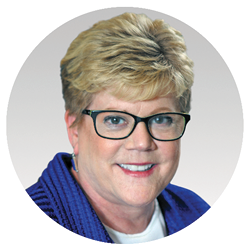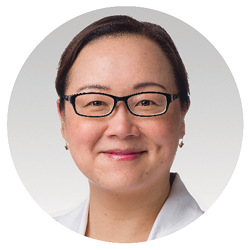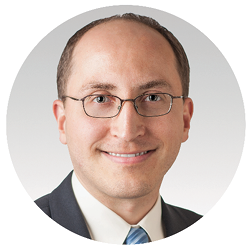Innovation Spotlight: Empowering Feinberg's Unsung Heroes
This story was published in the April 2023 issue of The Philanthropist, a newsletter for supporters and friends of Northwestern University Feinberg School of Medicine. Read the whole issue here.
Each day, our faculty, students, and trainees at Feinberg dedicate time to innovate new ideas and programs that will move the needle in medicine and science. Here, we spotlight some of the exciting work that often happens behind the scenes and beyond daily clinical care.
Thank you to all of the donors who contribute to these efforts, now and in the future. Your philanthropy fuels these projects and programs—enabling their very existence and empowering them to grow for the benefit of patients today and tomorrow.
 Developing Better Treatments for Traumatic Brain Injuries
Developing Better Treatments for Traumatic Brain Injuries
Theresa Bender Pape, DrPH, MA, CCC-SLP/L, FACRM, is a clinical neuroscientist with a dual appointment at Edward Hines, Jr. VA Hospital and Feinberg, where she serves as a research professor of Physical Medicine & Rehabilitation. Dr. Pape conducts research on behalf of persons with traumatic brain injury or TBI. Approximately 15 to 20 million people are living in a vegetative or minimally conscious state caused by severe TBI, and about every 5 seconds a US citizen suffers a moderate to mild TBI (also known as concussion). There are over 400,000 military personnel, from our most recent wars, coping with mild TBI, one-third of whom are also experiencing PTSD. Dr. Pape is the lead principal investigator for an interdisciplinary neuroscience team, the Neuroplasticity in Neurorehabilitation Laboratory. She is currently conducting clinical trials assessing treatments that combine non-invasive brain modulation, such as repetitive Transcranial Magnetic Stimulation and intermittent Theta Burst Stimulation, with learning-based interventions such as familiar auditory stimulation and attention training exercises. Preliminary findings demonstrate that these treatments are improving recovery of consciousness and communication, cognitive capabilities, PTSD, and performance of daily life activities.
For more information about supporting the efforts above, contact Mary Kreller at 312-503-0742 or mary.kreller@northwestern.edu.

 Studying Fibroids that Can Become a Lethal and Rare Cancer
Studying Fibroids that Can Become a Lethal and Rare Cancer
An estimated 20 to 50 percent of women of reproductive age currently have benign leiomyomas, commonly known as fibroids. Up to 77 percent of women will develop fibroids sometime during their childbearing years. Most women (and their physicians) see fibroids to be largely benign, so when and if some turn cancerous, it is often a shock. This reality spurred the research described here and will help answer how doctors and their patients can be better prepared for signs of malignancies. Jian-Jun Wei, MD, director of Gynecologic Pathology in the Department of Pathology, the Floyd Elroy Patterson Research Professor of Pathology, and professor of Pathology and Obstetrics and Gynecology, and Ping Yin, MD, PhD, research associate professor of Obstetrics and Gynecology (Reproductive Science in Medicine), are collaborating on the study “Exploring Genes and Pathways Transforming Benign Uterine Leiomyoma to Malignant Leiomyosarcoma.” In their study, they have several cases that show histologic and molecular features suggesting a tumor transformation or progression from fibroid to malignant leiomyosarcoma, which is a rare cancer that grows in the smooth muscle of the body and in organs such as the uterus. Drs. Wei and Yin have recently tested a new “omics” method defined as “spatial transcriptomic single cell analysis,” and an AI-based spatial analysis of histologic map for benign and malignant transformation in tissue section. These are powerful and innovative techniques to better define and map cellular changes in three-dimensional level and differentiate different cell types, as well as different stage of tumor cells. This test may help to clarify their hypothesis of tumor progression in tissue level. They recently submitted their preliminary data to the United States and Canadian Academy of Pathology, and it was accepted for the platform presentation at the 2023 meeting.
For more information about supporting the efforts above, contact Jordan Sund at 312-503-2706 or jordan.sund@northwestern.edu.
 On the Front Lines of Neurocritical Care and Research
On the Front Lines of Neurocritical Care and Research
Sherry Hsiang-Yi Chou, MD, MSc, associate professor of Neurology and chief of the Division of Neurocritical Care in the Ken and Ruth Davee Department of Neurology, is a physician-scientist with expertise in neurocritical care, vascular neurology, and biomarker discovery. Shortly after her arrival at Northwestern in 2021, Dr. Chou was also named the medical director for the Neuro/Spine ICU at Northwestern Memorial Hospital. Dr. Chou led her division and the Neuro/ Spine ICU through COVID-19 surges and rebuilding of neurocritical care services following a critical frontline personnel shortage due to COVID-19. Dr. Chou’s research program aims to understand the potential role of inflammation and immune responses in vascular brain injuries and brain-body interactions in critically ill, brain-injured patients. Specifically, Dr. Chou’s lab focuses on discovery and development of biomarkers to understand disease pathophysiology, assess disease progression, and predict outcomes in patients with severe hemorrhagic strokes and vascular brain injury.
For more information about supporting the efforts above, contact Andrew Christopherson at 312-503-3080 or andrew.christopherson@northwestern.edu.

 Empowering Clinicians through Communication Skills Training
Empowering Clinicians through Communication Skills Training
Julia Vermylen, ’11 MD, ’11 MPH, ’14, ’16 GME, assistant professor of Medicine (Hospital Medicine-Palliative Medicine) and Medical Education, and Gordon Wood, MD, ’07 GME, ’07 MS, associate professor of Medicine (Hospital Medicine-Palliative Medicine) and Medical Education, are using evidence-based communication skills training to ensure that seriously ill patients receive care that is aligned with what matters most to them. They co-lead the Northwestern Simulation Healthcare Communication Program, which has pioneered a simulation-based mastery learning approach to teaching clinicians how to have difficult conversations like delivering serious news or discussing goals of care when an illness is advancing. The method, a partnership with talented Chicago actors who portray the patients and their families, involves a pretest, a workshop, and a posttest with ongoing deliberate practice until everyone reaches a standard of mastery on a checklist developed by experts in the field. This approach ensures that everyone masters these crucial and challenging conversations. The program now includes 16 faculty from across the Feinberg School of Medicine and, since 2018, has taught over 1,300 people at Northwestern from all levels of training and a multitude of specialties.
For more information about supporting the efforts above, contact Meghan Monaghan at 312-503-1091 or meghan.monaghan@northwestern.edu.